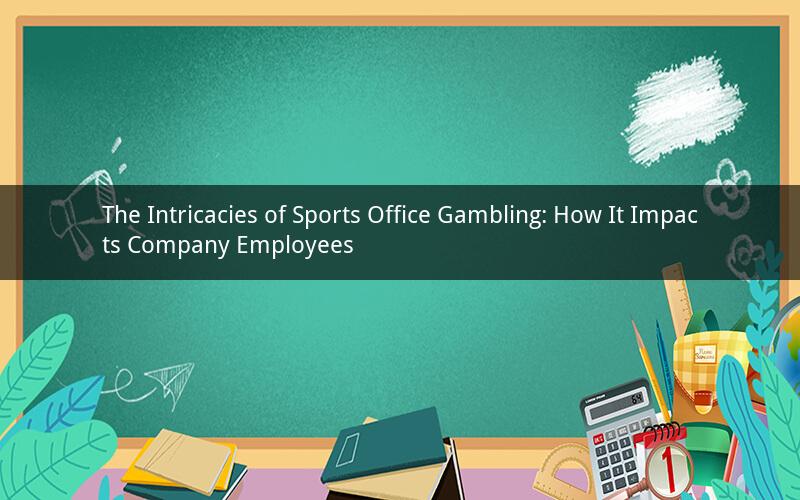
Sports office gambling has become an increasingly popular pastime among employees. With the advent of online sports betting platforms, it's easier than ever to place bets on games and events. However, the question remains: how does sports office gambling impact company employees? This article delves into the various aspects of this issue, including its effects on productivity, mental health, and workplace relationships.
I. Productivity
One of the most significant impacts of sports office gambling on company employees is its effect on productivity. While some may argue that it can boost morale and foster camaraderie, the reality is that it can lead to a decrease in productivity.
A. Distractions
Employees who engage in sports office gambling often find themselves distracted from their work. The allure of potential winnings can lead to constant checking of betting platforms, discussions about bets, and even placing bets during work hours. This can result in a loss of focus and a decrease in overall productivity.
B. Time management
Sports office gambling requires time and effort to research, analyze, and place bets. Employees who are passionate about sports betting may spend a considerable amount of time on this activity, which can detract from their work responsibilities. This can lead to missed deadlines, incomplete tasks, and a general decline in productivity.
C. Financial stress
For some employees, sports office gambling can lead to financial stress. The pressure to win and the potential for significant losses can cause anxiety and stress, which can further impact productivity. Employees who are preoccupied with their bets may find it difficult to concentrate on their work, leading to a decrease in overall productivity.
II. Mental Health
Sports office gambling can also have a significant impact on the mental health of company employees.
A. Anxiety and stress
The anticipation of winning or losing can lead to increased anxiety and stress. Employees who are engaged in sports office gambling may experience heightened levels of stress, especially during critical periods such as playoffs or championship games. This can lead to negative mental health outcomes, such as burnout and depression.
B. Gambling addiction
For some employees, sports office gambling can develop into a gambling addiction. This addiction can lead to a range of mental health issues, including anxiety, depression, and substance abuse. In extreme cases, it can even lead to financial ruin and the loss of employment.
C. Work-life balance
Engaging in sports office gambling can disrupt the work-life balance of company employees. The time and energy spent on betting can leave little room for personal activities, hobbies, and family time. This imbalance can lead to increased stress and a decline in overall mental health.
III. Workplace Relationships
Sports office gambling can also impact workplace relationships.
A. Division and conflict
Employees who engage in sports office gambling may develop strong allegiances to their chosen teams or players. This can lead to division and conflict among colleagues, as they become more focused on their bets than on their work. This division can create a toxic work environment and negatively impact team dynamics.
B. Favoritism and bias
Employees who are engaged in sports office gambling may show favoritism towards their chosen teams or players. This favoritism can lead to bias in decision-making and can create a sense of unfairness among colleagues. This can damage trust and collaboration within the workplace.
C. Social pressure
Employees who are not interested in sports office gambling may feel pressure to participate or conform to the group's interests. This social pressure can lead to discomfort and resentment, as employees feel forced to engage in an activity they are not interested in.
Questions and Answers:
1. How can companies mitigate the negative impacts of sports office gambling on their employees?
Answer: Companies can mitigate the negative impacts of sports office gambling by implementing clear policies on betting during work hours, providing resources for employees to seek help with gambling addiction, and fostering a positive work environment that encourages productivity and mental well-being.
2. Can sports office gambling improve employee morale?
Answer: While sports office gambling can improve employee morale to some extent, the potential negative impacts on productivity, mental health, and workplace relationships may outweigh the benefits. It's essential for companies to strike a balance between fostering a positive work environment and ensuring that employees remain focused on their work responsibilities.
3. How can employees manage their time effectively while engaging in sports office gambling?
Answer: Employees can manage their time effectively while engaging in sports office gambling by setting clear boundaries between work and personal activities, prioritizing their work responsibilities, and using time management techniques such as setting specific time limits for betting activities.
4. What are some signs that an employee may have a gambling addiction?
Answer: Signs that an employee may have a gambling addiction include spending excessive amounts of time and money on betting, neglecting work responsibilities, showing signs of stress or anxiety, and experiencing financial difficulties due to gambling.
5. How can companies promote healthy competition and camaraderie among employees without resorting to sports office gambling?
Answer: Companies can promote healthy competition and camaraderie among employees by organizing non-gambling-based team-building activities, recognizing and rewarding employee achievements, and fostering a culture of respect and collaboration. This approach can help create a positive work environment that encourages productivity and employee well-being.